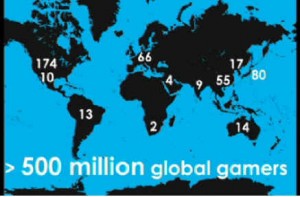On February 3rd, Jane McGonigal appeared on The Colbert Report. This woman has an opinion that you might be interested in. Because it is weird. Count. Er. Intu. Itive. Interesting. Weird. She is a game designer and wants the world to play more games and thinks that if people play more, this will contribute to solving the world’s problems. Let’s unwrap this a bit, starting with some statistics she points out in her TED talk of March, 2010.
People in the world play 3 billion hours of games each week.
World of Warcraft players have logged in 5.93 million years of game play to date. The average WoW player plays for 21 hours a week.
The average young person “in countries with strong gaming cultures” will spend 10,000 hours of time playing games by the age of 21.
Let that soak in for a moment. Then think about this: 10,000 hours roughly equals the total amount of time we spend in school K-12. Gaming, she says, represents “a parallel track of education.” And 10,000 hours is a term widely being used as a rough estimate of how many hours of effortful study are required for mastery of a skill (I first heard of it in Scientific American’s The Expert Mind written by Philip Ross in August 2006, but if you Google “10,000 hours of effortful study”, you’ll see how widely used this number has become).
Back to Jane. She says, gamers are getting good at or have developed a bond with 4 things:
- Urgent optimism (or extreme self-motivation to tackle obstacles immediately, coupled with a belief in success)
- Weaving a tight social fabric (playing games together builds trust)
- Blissful productivity (gaming is actually “hard work” and gamers are willing to do it)
- Epic meaning (the feeling of working towards meaningful goals–i.e., save the world)
Gaming creates “super-empowered hopeful individuals.” How can these people and this energy, this time, and this skill be put to use in improving the world? That is her question. She thinks it is possible and she is working on it now. By getting people to play games about life-connected issues, you can effect change. She thinks that challenging immersive experiences can be life-changing. Here is her TED talk. And here is Evoke, one of the games she helped develop.
Jane McGonigal’s blog
Edward Castronova’s blog (Indiana University professor of Telecommunications with a focus on games and social issues)

Pingback: Jesse Schell: Games and Authenticity: When Games Invade Real Life |
Pingback: Plants vs. Zombies vs. EFL Lesson Design